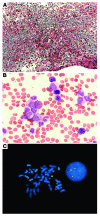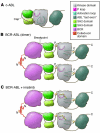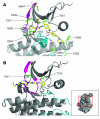Applying the discovery of the Philadelphia chromosome
- PMID: 17671641
- PMCID: PMC1934568
- DOI: 10.1172/JCI31988
Applying the discovery of the Philadelphia chromosome
Abstract
The identification of the Philadelphia chromosome in cells from individuals with chronic myelogenous leukemia (CML) led to the recognition that the BCR-ABL tyrosine kinase causes CML. This in turn led to the development of imatinib mesylate, a clinically successful inhibitor of the BCR-ABL kinase. Incorporating the use of markers of BCR-ABL kinase inhibition into clinical trials led to the realization that imatinib-resistant kinase domain mutations are the major cause of relapse during imatinib therapy and the subsequent development of new inhibitors to treat CML patients. The development of imatinib validates an emerging paradigm in cancer, in which a tumor is defined by genetic abnormalities and effective therapies are developed that target events critical to the growth and survival of a specific tumor.
Figures



References
-
- Nowell P.C., Hungerford D.A. Chromosome studies on normal and leukemic human leukocytes. J. Natl. Cancer Inst. 1960;25:85–109. - PubMed
-
- Rowley J.D. Letter: A new consistent chromosomal abnormality in chronic myelogenous leukaemia identified by quinacrine fluorescence and Giemsa staining. Nature. 1973;243:290–293. - PubMed
-
- Collins S.J., Kubonishi I., Miyoshi I., Groudine M.T. Altered transcription of the c-abl oncogene in K-562 and other chronic myelogenous leukemia cells. Science. 1984;225:72–74. - PubMed
-
- Shtivelman E., Lifshitz B., Gale R.P., Canaani E. Fused transcript of abl and bcr genes in chronic myelogenous leukaemia. Nature. 1985;315:550–554. - PubMed
Publication types
MeSH terms
Substances
LinkOut - more resources
Full Text Sources
Other Literature Sources
Medical
Miscellaneous

